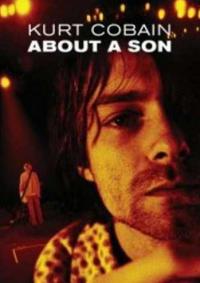
Kurt Cobain
About a Son DVD (2008)
Matt_Whelihan
In the 7th grade I must have read Michael Azerrad's book Come As You Are: The Story of Nirvana three or four times. First it was a borrowed copy from a friend's older brother, and then I had my own coveted little copy. This was at the height of my Nirvana obsession, so while the rest of my classmates top priorities were the new Foxy Brown single and how many goals Eric Lindros had scored the night before, I would be doodling the Seattle trio's simple logo on folders and pondering whether I should get a flannel shirt or not.
At the time my massive CD collection consisted of discs from Nirvana, Green Day, the Smashing Pumpkins, Everclear and Silverchair, yet none of those other bands' frontmen spoke to me in the way Kurt Cobain did. Maybe it had to do with the fact that he had already been dead for a couple of years at this point, or that MTV and the music press were already establishing him as a creative genius and cultural revolutionist, but he just seemed more mythical, more worthy of pedestal placement, more of an outcast king, and Michael Azerrad's book only deepened my devotion.
It was through Kurt Cobain's descriptions of his school days that I began to feel like an empathetic soul, one that could condemn the jocks (ironic considering I was playing on a baseball and soccer team at the time), use music as an escape from the world (again humorous considering my tumult-free upbringing) and dream about being in a successful band. His bitterness and cynicism also hit close to home as I was slowly, but surely, adopting my own brand of teenage angst between episodes of "X-Men" and lengthy sessions of playing Golden Eye on N64.
Maybe a couple years later I did discover Blink-182, MxPx, and the entire Epi-Fat rosters and declare myself a punk, but I've never fully lost interest in the mystique of Kurt Cobain. So when I heard about the concept behind Kurt Cobain About a Son, I was interested. Here were all those tapes Azerrad had recorded during night-long chat sessions with Cobain being played over a series of shots from Aberdeen, Olympia, and Seattle. While the concept may not exactly sound complicated or multifaceted, the result is an often strikingly artistic film, one that conveys a range of emotions in its non-traditional execution.
Director AJ Schnack seems to have carefully chosen the imagery here (a fact confirmed in the extras) as he moves from the logging mills and run-down homes of Aberdeen to the colorful, bohemian outpost of Olympia and finally to the dichotomous Seattle, where wooded suburbs meet gritty, major city streets. Along the way he visits numerous locations from Cobain's life, such as his high school, an apartment he shared with Dave Grohl and a hotel where he cleaned fireplaces, helping to provide not only visual accompaniment to the conversations heard in the film but also to the moods and themes found in the music of Nirvana.
Schnack also seems diligent in his selection of audio. Azerrad claims to have had about 25 hours worth of recordings and with the film's running time just breaking two hours it is obvious major cuts had to be made. What Schnack does leave is a chronological journey through Cobain's life that takes him from his depressed childhood to his lazy years of artistic development where he either lived on couches or on a girlfriend's dime and finally to his massive success, drug issues, and subsequent battles with the media.
When Cobain and Azerrad aren't speaking, the film's soundtrack consists of songs from bands and artists that influenced Cobain such as the Butthole Surfers, Leadbelly, the Vaselines and the Melvins as well as some original music from Steve Fisk and Ben Gibbard (credited here under the very soundtrack-scoring moniker of Benjamin Gibbard). These sounds, much like the images, provide context for Cobain's musings. Whether he's angrily discussing journalists and songwriting credit or recalling how he used to replace his mom's weed with oregano and Nirvana's first show, the music imparts an appropriate emotional resonance.
As I've already mentioned, I still maintain a great deal of respect for Kurt Cobain and his music, and while I enjoy the re-contextualization of his life that About a Son provides, my only complaint would be that the film failed to generate any sort of new ties between me and the deceased artist. This may be a wholly personal issue, but it's just that the correlation between his perpetual animosity and my 7th grade growing pains were clear enough upon reading Azerrad's book, whereas after watching the film all I could think was that Cobain was an older man at the time of those interviews than I am now, making some of his violent revenge comments and 'fuck the world' laments seem strangely regressed for an intelligent adult.
Sure, not every comment or story in the film sounds like it is coming from the perspective of some teenage curmudgeon, and yes, I understand that Cobain was under intense media scrutiny at the time these interviews were conducted, but part of him just seems to have never grown up. Maybe this is what ignited the fiery heart of Nirvana, or maybe this is what appealed (and still appeals) to so many people about Cobain, or maybe, as many writers, including Azerrad, suggest, his demeanor doesn't necessarily have to do with being immature or socially stunted, but is merely a premeditated disposition he adopted to provide an image that would make for an enigmatic figure, interesting interviews, and now, an intriguing film.